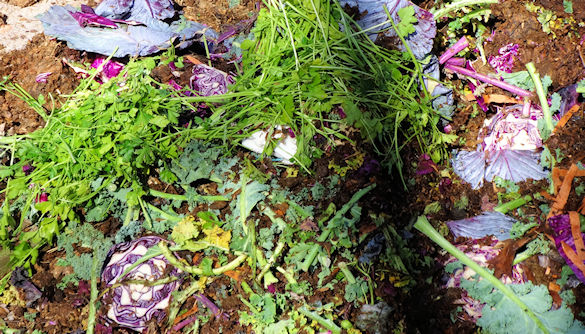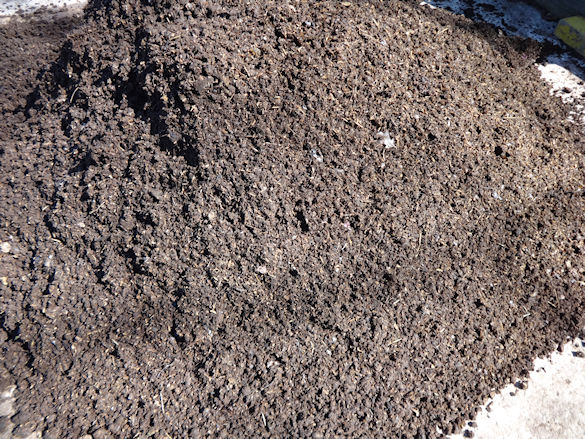The substance that breathes life into soil
 |
Our first compost piles have now cooled down after about six weeks of steamy magic going on inside them. We have been turning these piles every week to maintain the ideal balance of oxygen, moisture, and warm temperatures that act as an incubator for beneficial soil microbes. Within these piles, organic waste has been quickly (almost miraculously) turned into rich, chocolate brown, crumbly compost — teeming with the beneficial biology that transforms average soil into living soil, full of plant helpers. A small spoonful of this kind of compost contains more living organisms than all of the humans on earth.
The importance of microbes
“The human microbiome is composed of bacteria, archaea, viruses and eukaryotic microbes that reside in and on our bodies. These microbes have tremendous potential to impact our physiology, both in health and in disease. They contribute metabolic functions, protect against pathogens, educate the immune system, and, through these basic functions, affect directly or indirectly most of our physiologic functions.” US National Library of Medicine, National Institutes of Health
Soil microbes are as fundamental to plant health as microbes in our bodies are to our health. Plants have been living in symbiotic relationships with these microbes since they first dug their roots into the soil hundreds of millions of years ago.
These microbes digest nutrients from the soil and fertilizers, turning them into the nutrient rich compounds that your plants can use. This is how and where our food chain begins — feeding plants as they have been doing for hundreds of millions of years. As with human microbes, they also provide many other benefits. They physically protect roots from predation, and they produce growth hormones and compounds that protect the entire plant from disease and environmental stresses.
High density
Only in a well-managed compost pile do you find the warm (130˚ F), moist, oxygen rich environment for these life giving microbes to explode in numbers. This dense population is responsible for the rapid decomposition of organic matter.
High diversity
The diversity of substances that go into your pile determine the diversity of microbial decomposers. Greater diversity of decomposers means more complete absorption of all of the essential nutrients by your plants.
For example, without specific microbes that decompose soil materials to obtain phosphorus to your plants, insoluble phosphorus in the soil stays in the soil, unavailable to your plants. This is actually happening across the country today. So we use soluble phosphorus to feed plants and again, without proper soil biology, it quickly leeches through the soil and into our streams and lakes, feeding our algae blooms. Instead of a slow, steady supply of phosphorus obtained naturally from the soil, we drench the soil with soluble phosphorus, eventually polluting streams and lakes with it.
Our compost is made from the waste from our salad mix which contains the greatest diversity of nutrients of any food — things like organic kale, carrots, and cabbage — along with other nutrient rich organic vegetables like unsold broccoli and Brussels sprouts.
 |
High microbe populations turn nutrient rich food waste into biologically rich compost in just a few weeks.
 |
Now that they have cooled down, even with additional stirring, we are letting our first compost piles enter another phase to build even more microbial diversity. It should be ready to use and sell soon.
Compost myths
- Since these microbes require elevated oxygen levels to live, compost stored or purchased in sealed bags does not contain the living microbes that are found in fresh compost.
- Composting without the steamy, warm environment found in an active compost pile does not contain the microbial diversity or density of premium compost. It can also pass along weed seeds or plant pathogens.
These types of “compost” do not supply your garden soil with the soil biology plants need to flourish. Nutrients are also leeched by rain and snow melting during the many months of slow decomposition.
Application
Just as people need to repeatedly take digestive probiotics today, soil microbes also have to be reintroduced periodically. They are lost because of things like tilling, omnipresent chemicals, barren winter conditions, and other cultural practices.
Fresh compost is used as an inoculant to introduce or replenish biology to soil that has been barren for several months now. Years ago, because of the enhanced growth from compost applications, people thought of it as a fertilizer. It is more of a probiotic for your soil that stimulates and increases the absorption of nutrients in the soil to your plants.
Quality compost makes quality organic fertilizers more effective.
Since quality compost provides a greater diversity and density of beneficial microbes, you don’t need as much to inoculate your garden soil.
Simply spread a thin layer of our compost on your soil (about 1/2″) and water it in well — or rake it in to the top inch or two.
Warning!!!
We only have a limited amount of our premium compost every year — get yours early — we always sell out. We also use it ourselves to grow better food for our CSA members and to inoculate our potting mix.
Our vegetable and flower transplants are not just healthier plants, they are healthier for your soil.
Since we use our compost in our transplanting soil, our potted plants can also bring this microbial magic into your garden soil.

